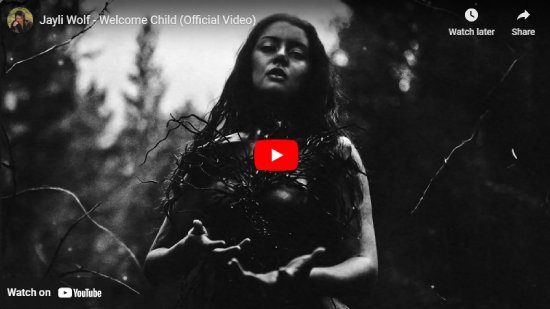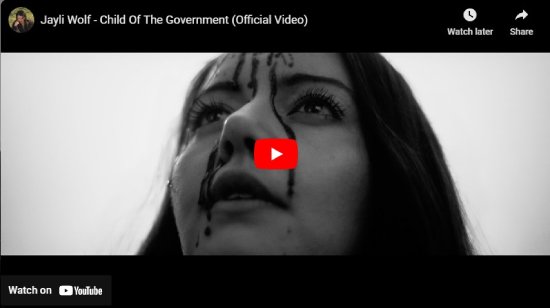Since quitting university a decade ago to pursue artistic endeavours, Jayli Wolf has blossomed into a multi-hyphenated creative talent. Anishinaabe/Cree and queer, she’s a singer-songwriter, producer, poet, actor, and video director, who first gained attention in Once A Tree, a folk-accented duo with husband Hayden Wolf.
They released two EPs and three full-length albums between 2013 and 2021, when Jayli debuted as a solo artist with the EP Wild Whisper, which earned a JUNO Award nomination for Contemporary Indigenous Artist of the Year.
Released in September of 2023, her second solo EP, God Is An Endless Mirror, showcases Wolf’s evolution as a songwriter, and she’s delighted at the response to it. “Now, I’m reaching people I’d like to hang out with,” she tells us, from her farm in Creston, BC. “They’re starting to see the real me, and that’s attracting people with the same interests – like nature, spirituality, and rescuing animals.
“When I first started making music, I was really doing it for other people, and to make money,” she continues. “The stuff I was putting out to the world felt inauthentic to me, but going through a spiritual re-awakening a couple of years ago has totally changed everything. Now, I just have to be truthful, and honest ,and tap into what’s going on in my heart, for the music I want to release.”
God Is An Endless Mirror features a hybrid of organic folk and electronic sounds. “I went really inward with the lyrics here, and started out with more folk elements,” she says. “Hayden and I then added electronic elements, sometimes at the end, after the song was done. We wanted to make it atmospheric, bringing that energy of my spiritual awakening into the sonics, alongside the organic sounds.”
The Wolfs have a well-tested method in their songwriting and recording collaboration. “The lyrics are all mine, and most of the melody, but Hayden is my producer,” Jayli Wolf explains. “I’ll freestyle lyrics, then sometimes I’ll start playing the song on a guitar, and he’ll come in and add a beat, or different instruments, to it. He may take a song to a different place by changing up just one instrument on the same melody. He puts his own spin on the production, and I really trust his ears, so it’s a great partnership.”
Her very first solo single and video, “Child Of The Government,” has had an impact beyond the statistic of more than a million YouTube views; it also won Best Music Video at the Venice Short Film Awards, and placement on CBC’s Top 10 Canadian Songs of 2021 list.
The song drew upon the real-life experience of her father, a survivor of the infamous Sixties Scoop in Canada, that tore Indigenous children away from their families. “The lyrics for ‘Child of The Government’ came out in five minutes,” says Wolf. “I wasn’t even sure I was going to put it out, as it was so personal. Often, I’ll just write music as a catharsis for me, and for my own healing, without sharing it with the world. I checked with my dad that it was OK to share it. He thanked me recently, as I think telling his story through my music was healing for him, too.”
In tandem with her musical career, Wolf has been a prolific actor on television and in short films, including such TV series as Mohawk Girls and Trickster. In 2021, she was nominated as Best Supporting Actress in the American Indian Film Festival, for her role in Run Woman Run. Wolf has put her acting and filmmaking experience to good use by creating multiple music videos for her material, which have generated impressive viewing numbers.
She’s giving her music and poetry priority over acting, at present. “When I was acting, it was just so hard to concentrate on getting another project done, and I really feel that right now my music deserves my focus,” says Wolf. “I’m working on an album and a book of poetry, and I’m running a farm and have rescue animals, so I’m definitely keeping busy!”

